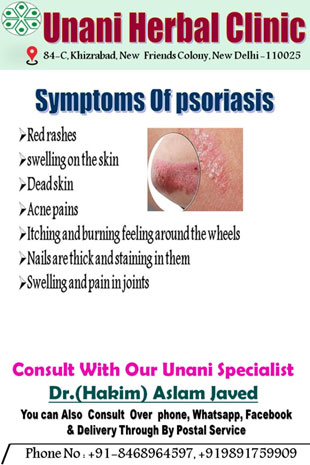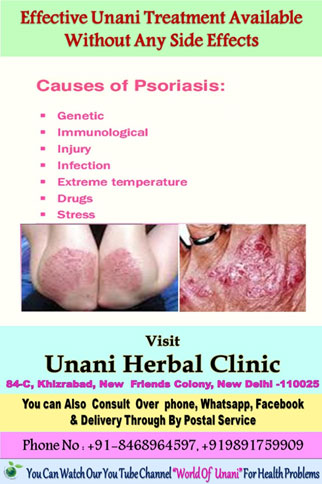Issue :- 84
What Is Psoriasis?

What Is Psoriasis?
Psoriasis is a skin disorder that causes skin cells to multiply up to 10 times faster than normal. This makes the skin build up into bumpy red patches covered with white scales. They can grow anywhere, but most appear on the scalp, elbows, knees, and lower back. Psoriasis can't be passed from person to person. It does sometimes happen in members of the same family. psoriasis can cover large parts of the body.

Symptoms
The symptoms of psoriasis vary depending on the type you have.
- Red patches of skin covered with thick, silvery scales
- Small scaling spots
- Dry
- Itching
- burning or soreness
- Thickened, pitted or ridged nails
- Swollen and stiff joints

Psoriasis patches can range from a few spots of dandruff-like scaling to major eruptions that cover large areas. The most commonly affected areas are the lower back, elbows, knees, legs, soles of the feet, scalp, face and palms.
Causes
- 1. Immune system
- 2. Genetics
- 3. Stress
- 4. Injury
- 5. Medications
- 6. Infection

Types
Other types of psoriasis include:
Pustular psoriasis : which causes red and scaly skin with tiny pustules on the palms of the hands and soles of the feet.
Guttate psoriasis : which often starts in childhood or young adulthood.
Inverse psoriasis : which makes bright red, shiny lesions that appear in skin folds, such as the armpits, groin, and under the breasts.
Erythrodermic psoriasis : which causes fiery redness of the skin and shedding of scales in sheets. It needs to be treated immediately because it can lead to severe illness.
Risk factors
Anyone can develop psoriasis. About a third of instances begin in the pediatric years. These factors can increase your risk:
- Family history. The condition runs in families. Having one parent with psoriasis increases your risk of getting the disease, and having two parents with psoriasis increases your risk even more.
- Stress. Because stress can impact your immune system, high stress levels may increase your risk of psoriasis.
- Smoking. Smoking tobacco not only increases your risk of psoriasis but also may increase the severity of the disease. Smoking may also play a role in the initial development of the disease.
Complications
If you have psoriasis, you're at greater risk of developing other conditions, including:
- Psoriatic arthritis, which causes pain, stiffness and swelling in and around the joints
- Eye conditions, such as conjunctivitis
- Obesity
- Type 2 diabetes
- High blood pressure
- Cardiovascular disease
- Other autoimmune diseases
- Mental health conditions, such as low self-esteem and depression

Nomination form for 2020 Global Awards
https://www.unaniherbal.org/nomination-form.html
For Consultation click here
Copyright 2014 Unani Herbal
If you wish to cancel your subscription to this newsletter click here





